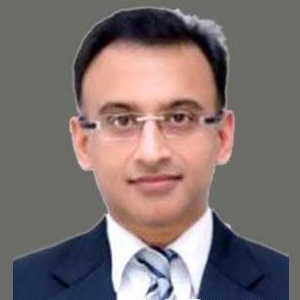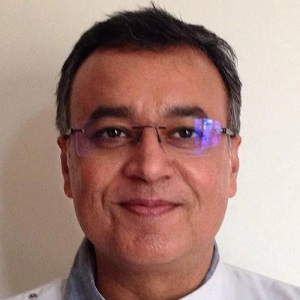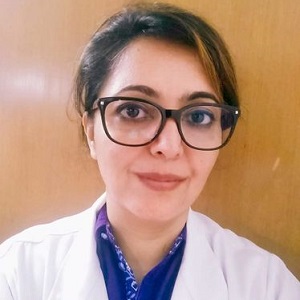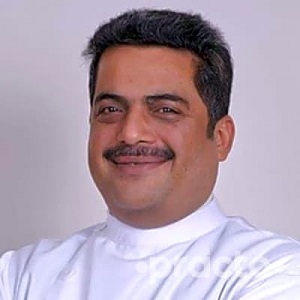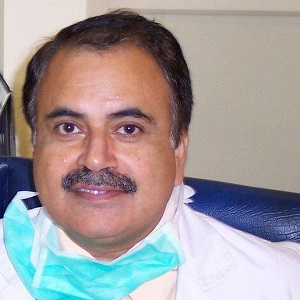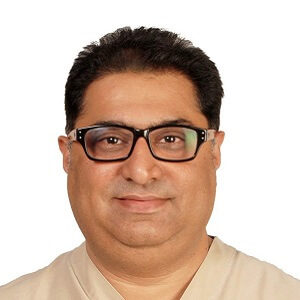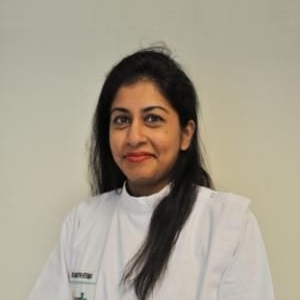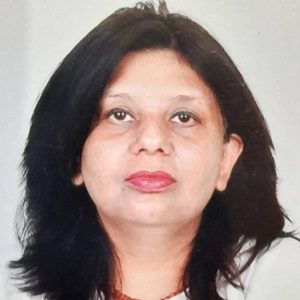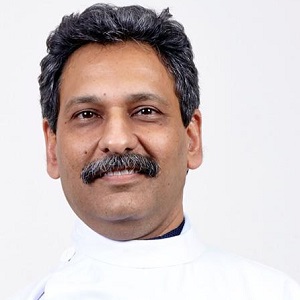Best Doctors in India for Dental Crown
- Dentist and Dental Surgeon, New Delhi, India
- Over 21 years’ experience
Profile Highlights:
- Dr. Adosh Lall is one of the best dentists in India. He is having an experience of over 21 years.
- He has been involved in imparting education to graduate and postgraduate students for 14 years. Also, he is an examiner of postgraduate students in India and Nepal.
- Dr. Adosh Lall has treated innumerable patients successfully in his past years as a dentist.
- Dentist, New Delhi, India
- Over 24 years’ experience
Profile Highlights:
- Dr. Jatin Ahuja is one of the most successful Orthodontists who has 24 years of experience in this field.
- He has performed numerous operations related to oral cavities in India and abroad.
- He has been treating several diseases related to oral health.
- Dentist, New Delhi, India
- Over 27 years’ experience
Profile Highlights:
- Dr. Smriti Bouri is a leading female Dental consultant who has been serving people for the last 27 years.
- She has performed a wide array of procedures all related to dental care.
- She served in the Indian Army during the early years of her career as a dentist.
- Dentist, Gurugram, India
- Over 20 years’ experience
Profile Highlights:
- Dr. Ravi S Batra is one of the most popular faces in the Department of Dentistry.
- He has 16 years of experience in treating patients who belong to different age groups.
- Dr. Batra has expert hands in diagnosing and treating orthodontic problems which mostly need surgical rectification.
- Dentist and Dental Surgeon, New Delhi, India
- Over 35 years’ experience
Profile Highlights:
- Dr. Neeraj Verma is one of those prominent dentists in India who is having more than 35 years of experience.
- He is the vice president of the Indian Dental Association in Delhi.
- Due to his sound experience in Dentistry, Dr. Neeraj Verma received the Vishisht Seva Medal by the President of India.
- Dentist and Dental Surgeon, New Delhi, India
- Over 32 years’ experience
Profile Highlights:
- Dr. Ashish Kakkar is a Dentist at Indraprastha Apollo Hospitals, New Delhi providing the best Dental care in India. He has an experience of more than 32 years.
- Dr. Kakkar is a dental surgeon providing advanced dental care to patients. Patients can reach out to him for specialized services like dental checkups, teeth reshaping or remodeling, prosthodontic treatment or Cosmetic/Aesthetic dentistry, RCT, Pulpectomy, treatment of gum ailments, sinus augmentation, and identification & treatment of tooth decay.
- Dentist, New Delhi, India
- Over 10 years’ experience
Profile Highlights:
- Dr. Aishwarya Verma is one of the leading Dental Consultants in India.
- She has been an excellent student throughout her academic life. She has completed BDS and MDS with flying colors.
- She has treated patients both within India and abroad and is widely known for her success.
- Dr. Aishwarya has diagnosed several cases related to oral health and treated them with her knowledge and experience.
- Dentist, Gurugram, India
- Over 20 years’ experience
Profile Highlights:
- Dr. Anjana Satyajit is a dedicated dentist with an experience of more than two decades.
- She is an expert in Endodontics and has been treating numerous patients all over the country.
- Dr. Satyajit has received her Graduation in Dentistry from Maulana Azad Medical College in Delhi.
- Dentist, Gurugram, India
- Over 20 years’ experience
Profile Highlights:
- Dr. Payal Nayar has been practicing dentistry for the pediatrics department for the last 20 years.
- She has expert hands in oral rehabilitation, pediatric root canals, orthodontic treatment, rampant caries, etc.
- She received Certification in the field of Prosthetic Dentistry from Smile India.
- Dentist, Gurugram, India
- Over 20 years’ experience
Profile Highlights:
- Dr. Vineet Ohri is one of those prominent dentists in India who has received special training in Endodontics.
- He has 20 years of experience in treating patients.
- Dr. Ohri worked in prominent hospitals like Indraprastha Apollo and Fortis Hospital, Vasant Kunj.
Best Hospitals in India for Dental Crown
Indraprastha Apollo Hospital, New Delhi
- City: New Delhi, India
Hospital Highlights:
- Indraprastha Apollo Hospital is a 700-bedded multispecialty hospital in the heart of the capital of India. It is a part of Apollo Hospital group, one of India’s most reputed healthcare chains. Indraprastha Apollo Hospital has been accredited by Joint Commission International, making it the first internationally accredited hospital in the country in 2005.
- There are 52 specialties in the hospital with one of the best cardiology centers in the country. The hospital is also equipped with State of the art infrastructure facilities with the largest Sleep Lab in Asia and the largest number of ICU bed facilities in India.
- The hospital also has one of the largest dialysis units in India along with a dedicated Bone Marrow Transplant unit.
- The latest and highly advanced technologies that are installed in the hospital include Da Vinci Robotic Surgery System, PET-MR, PET-CT, Cobalt-based HDR Brachytherapy, Brain Lab Navigation System, Tilting MRI, Portable CT scanner, 3 Tesla MRI, 128 Slice CT scanner, DSA Lab, Endosonography, Hyperbaric Chamber and Fibro scan.
Fortis Memorial Research Institute, Gurugram
- City: Gurugram, India
Hospital Highlights:
- Fortis Memorial Research Institute is a multi-super-specialty, quaternary care hospital with 1000 beds. The hospital comprises reputed clinicians, and international faculty and is also equipped with cutting-edge technology. The hospital is a part of Fortis Healthcare Limited, a reputed chain of private hospitals in India.
- It is a NABH-accredited hospital that is spread across 11 acres of land and has a capacity of 1000 beds. The hospital has 55 specialties and is one of the premier health care centers in the Asia Pacific region popularly known as “the Mecca of Healthcare”.
- The hospital has 260 diagnostic centers and is also equipped with the latest and advanced techniques that include 3 Telsa which is the world’s first Digital MRI technology. The hospital also has world-class Radiation Therapy techniques which have been developed by leading technology experts from Elekta and Brain Lab.
Apollo Hospital, Chennai
- City: Chennai, India
Hospital Highlights:
- Apollo Hospitals, Chennai, is one of the best hospitals for heart care in India. Over the years, Apollo has expanded all over India, as a healthcare chain.
- India’s first ‘Only Pancreas’ transplant was performed in Apollo Hospital. The hospital is known for successfully performing Asia’s first en-bloc combined heart and liver transplant, and over the years, it has attained a remarkable achievement in the global healthcare space. Around 3-4 organ transplants are performed in the hospital per day.
- Equipped with over 500 beds, this hospital in Chennai was established in 1983 and since then has been among the most preferred hospital for patients from all over the world.
- The hospital holds accreditation of the NABH and JCI and is the first hospital in India to be ISO 9001 and ISO 14001 certified. It is also the first South Indian Hospital to receive subsequent reaccreditation from the JCI USA 4 times.
Medanta-The Medicity, Gurgaon
- City: Gurugram, India
Hospital Highlights:
- One of India’s best and largest multi-specialty hospitals, Medanta was built with the aim to bring India to the highest standards of medical care. The hospital has been providing the best medical services to its patients, since its inception, with care, commitment, and compassion.
- Equipped with 1250 beds, the hospital was founded by Dr. Naresh Trehan in the year 2009 with an aim to provide the best medical care at affordable costs. The hospital is spread across 43 acres and includes 45 operation theatres and 350 beds dedicated solely to ICU. The hospital includes over 800 doctors, and more than 22 specialty departments and has a dedicated floor for individual specialty in order to offer the best services under one roof.
- The hospital is considered one of the premier institutes in India for Cardiac Care and includes staffs and members of high caliber. The hospital has 6 distinct centers of excellence.
Max Super Specialty Hospital, New Delhi
- City: New Delhi, India
Hospital Highlights:
- One of the well-regarded providers in India committed to the highest standards of clinical excellence and patient care, Max Super Specialty Hospital is a part of Max Healthcare, which is the second-largest healthcare chain in India. Regarded as one of the most well-regarded healthcare providers in the country, Max Super Specialty Hospital is committed to the highest standards of clinical excellence as well as patient care. The hospital is also equipped with the latest technology as well as cutting-edge research. The hospital is known to deliver and ensure the highest level of patient care.
- The hospital has more than 500 beds and offers treatment for over 35 specialties. The hospital also holds the credit of having installed the first Brain Suite in Asia. This is a highly advanced Neurosurgical machine that allows MRI to be taken while surgery is ongoing.
- Other advanced and latest technologies are also installed in the hospital such as the 1.5 Tesla MRI machine, 64 Slice CT Angiography, 4D ECHO, LINAC, and 3.5T MRI machine.
Artemis Hospital, Gurugram
- City: Gurugram, India
Hospital Highlights:
- One of the most well-known hospitals in the Delhi NCR, Artemis Hospital is the first hospital in Gurugram to get accredited by the Joint Commission International.
- With more than 40 specialties, the hospital has been designed to be one of the most technically advanced hospitals in the country, with the best medical and surgical health care. The hospital has eleven special and dedicated centers, for Heart, Cancer, Neurosciences, etc.
- The latest technologies in the hospital include Endovascular Hybrid Operating Suite and Flat panel Cath Labs for the cardiovascular department, 3 Tesla MRI, 16 slice PET CT, 64 Slice Cardiac CT Scan, HDR Brachytherapy, and highly advanced Image Guided Radiation Therapy techniques (LINAC) are installed in the hospital.
- The hospital has won several awards as well, since its inception.
BLK Max Super Specialty Hospital, New Delhi
- City: New Delhi, India
Hospital Highlights:
- Equipped with 650 beds, BLK Superspecialty Hospital is the largest stand-alone private sector hospital in Delhi.
- With over 1500 healthcare providers and 150 globally renowned super specialists, the hospital is one of Asia’s largest Bone Marrow Transplant Centres. The hospital is known for having some of the best cancer doctors in the country.
- The hospital is NABH and NABL accredited and was inaugurated by the first Prime Minister of India. Pt. Jawahar Lal Nehru.
Gleneagles Global Hospitals, Chennai
- City: Chennai, India
Hospital Highlights:
- Established in 1999, Gleneagles Global Hospital, Chennai, is one of the top healthcare facilities in Southern India. It is part of the Gleneagles Hospital Chain, which is the fourth largest healthcare chain in the country. The hospital specializes in multi-organ transplants of kidneys, liver, lungs, heart, etc.
- The hospital has an excellent infrastructure and state-of-the-art lab and equipment set-up. The hospital boasts cutting-edge technologies, a highly skilled team of doctors and surgeons, and trained support staff. Located in Perumbakam, Chennai, it is one of India’s premier health care destinations. The hospital has performed some of the most complex surgical and clinical procedures in India including multi-organ transplantations.
- The hospital’s lung transplantation program is one of the best in the country. The hospital is known for having performed India’s first single lung transplant and first minimal invasive lung transplant. It is also the only Indian hospital to be associated with King’s College Hospital, London, United Kingdom for liver transplantations.
Fortis Hospital, Mulund, Mumbai
- City: Mumbai, India
Hospital Highlights:
- Fortis Hospital in Mulund is a 315-bed multi-speciality tertiary care hospital with five JCI accreditations that offers a wide variety of diagnostic and therapeutic services. The Fortis Hospital in Mulund delivers patient-centred treatment with cutting-edge technology, highly skilled and experienced surgeons, and paramedical staff.
- This institution houses Maharashtra’s largest multi-organ transplant centre. It is also the first heart transplant centre in western India to conduct 100 or more consecutive heart transplants in under four years. It is the only hospital in the city to have multi-organ transplants and has handled the youngest patient for angioplasty. Fortis Hospital Mulund now boasts the first advanced surgical robot in central Mumbai.
- Cardiology and heart surgery, urology, nephrology, neurosciences, orthopaedics, digestive care, emergency and critical care, and maternity care are among the services provided by the hospital.
Kokilaben Dhirubhai Ambani Hospital, Mumbai
- City: Mumbai, India
Hospital Highlights:
- Kokilaben Dhirubhai Ambani Hospital, Named after the wife of Indian industrialist Dhirubhai Ambani, the founder of Reliance Industries, this is one of the top hospitals in Mumbai. This 750-bed multi-specialty hospital became operational in 2009. Known as one of India’s most advanced tertiary care facilities, the hospital is designed to raise India’s global standing as a healthcare hub, with an emphasis on excellence in clinical services.
- Kokilaben Dhirubhai Ambani Hospital uses Protocol and Care Pathway based treatment models to ensure the best outcomes for patients.
- The hospital represents a confluence of top-notch talent, cutting-edge technology, state-of-the-art infrastructure, and, most importantly commitment.
- The hospital also holds the accreditation of the NABH, NABL, CAP, and JCI.
- The hospital has been recognized as the No. 1 Multispecialty Hospital in Mumbai and the West Zone for the fifth year in a row in 2020 by The Week.
DENTAL CROWN
Dental crown is basically a covering or a cap for a tooth that has been damaged. It is made using a variety of materials, which can include porcelain or metal. The crown not only helps a tooth improve its appearance but also helps to restore its shape, strength and size.
After being cemented into place, a crown will be fully encasing the entire visible portion of a tooth that lies at and above the gum line. Before undergoing the procedure, you should discuss with your dentist your various options, so that he/she can figure out what meets your needs the best.
Purpose
A dental crown is needed in various situations:
- To prevent a weak or decayed tooth from breaking or to hold together parts of a cracked tooth
- To cover and support a tooth with a large filling when there isn’t much of the tooth left
- To restore a tooth that is already broken down or a tooth that has been worn down severely
- Covering teeth that are misshapen or severely discolored
- Holding a dental bridge in place
- To make a cosmetic modification
- To cover a dental implant
A crown may be needed for children on their primary teeth for the following reasons:
- Saving a tooth that has been too damaged by decay and is unable to support a filling
- Protect the teeth of a child who is at high risk for tooth decay. This is especially required when a child has difficulty keeping up with his/her daily oral hygiene.
In such cases, generally, a stainless steel crown is recommended by a pediatric dentist.
Types
Permanent crowns are made from stainless steel, ceramic or metals like gold and other alloys.
Stainless steel crowns are prefabricated crowns to be used on permanent teeth primarily as a temporary measure. This crown helps to protect the tooth or filling while a permanent crown is being prepared from another material.
Metals which are used in crowns usually include alloys having a high content of gold or platinum or base-metal alloys (such as cobalt-chromium and nickel-chromium alloys). Metal crowns are able to withstand biting and chewing forces well and therefore, they usually last the longest in terms of wear-down. Metal crowns are known to chip or break quite rarely, which is another advantage. However, one drawback is the metallic color and the high price of gold. Metal crowns can, however, be a good choice for out-of-sight molars.
Porcelain-fused-to-metal dental crowns can be matched to the color of your adjacent teeth, unlike the metallic crowns. However, you should also note that they usually cause more wearing to the opposing teeth, as compared with metal or resin crowns. The crown’s porcelain portion may sometimes chip or break off. Porcelain-fused-to-metal crowns usually look like normal teeth. However, in some cases, the metal which is underlying the crown’s porcelain can show through as a dark line, especially at the gum line and even more, if the gums recede. These crowns are a better choice for front or back teeth as well as long bridges where the metal is required for strength.
All-resin dental crowns can be less expensive than other crown types, but the disadvantage is that they wear down over time. As compared to porcelain-fused-to-metal crowns, they are also more prone to fractures.
All-ceramic or all-porcelain dental crowns are known for providing better natural color match than any other crown type. They are generally more suitable for people who are allergic to metal.
Preparation and procedure
Usually, two visits to your dentist are required when you prepare your tooth for a crown.
At your first visit in preparation for your crown, your dentist might take few X-rays for checking the roots of your tooth which will be receiving the crown and its surrounding bone. If your tooth is going through extensive decay or if there is any risk of infection or injury to the pulp of the tooth, then first a root canal treatment might need to be performed.
Before the crown-making process begins, your tooth and its surrounding gum tissue will need to be numbed. After this, your tooth is reshaped along the chewing surface and sides to help make room for the crown. The amount that is removed will depend on the type of crown used. However, if a large area of the tooth is missing from your tooth, due to decay or damage, your dentist will be using filling material for building up the tooth for supporting the crown.
After your tooth is reshaped, your dentist can use a paste or putty for making an impression of the tooth to receive the crown. Impressions can be made with a digital scanner. They will be sent to a dental lab, for the crown to be manufactured. Within three weeks, the crown will be returned to your dentist’s office. If your crown is made from porcelain, then your dentist will also need to select the shade that matches the color of the neighboring teeth.
In your first visit, your dentist will make you a temporary crown for covering and preparing the prepared tooth, while the permanent crown is being prepared.
At your second visit, the dentist will first remove the temporary crown. Then he/she will check the fit and color of the permanent crown. If everything is acceptable, they will be using a local anesthetic to numb the tooth after which they will be placing the permanent crown.
Aftercare
Once the crown has been fit, it is very important to take proper care of it, to help prolong its life.
Practice brushing your teeth carefully. It is best if you brush your teeth at least twice a day. You can consider using toothpaste which is meant for sensitive teeth.
Avoid hard foods. Chewing hard foods or ice can lead to your crown cracking, especially if it is made of porcelain.
Risks and complications
Though a crown can be a very useful solution to significant tooth problems, there are few risks and possible complications that you might experience after the procedure:
- Teeth sensitivity- It’s not uncommon for a crowned tooth to become sensitive to heat or cold.
However, if you find your tooth very sensitive to pressure when you bite down, the fit may be off. You should talk with your dentist about changing the placement of the crown or the filling down the top of your crown.
- Chipped crown- Certain types of crowns, notably all-porcelain crowns, can be more vulnerable to chipping. However, small chips can be easily fixed by your dentist.
The porcelain used for porcelain-fused-to-metal crowns can break away sometimes. This can reveal the metal structure underneath. If the metal is still intact, these chips may not need to be repaired.
- Gum disease- If you see the gums around your crown getting sore or irritated, or if you see this area bleeding, it could be that you are developing gingivitis or gum disease.
- Crown knocked out or loose- Your crown can sometimes get loose or fall out if there’s not enough cement to keep it in place. You should consider calling your dentist if you feel your crown loose or wiggly.
- Allergic reaction- Although quite uncommon, few people can sometimes have an allergic reaction to the metal which is used in some crowns.

